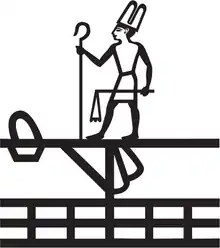Andjety
Andjety (meaning "He of Andjet") is a local ancient Egyptian deity of the ninth nome, centered at Andjet, which was known as Busiris to the Greeks.[1] This deity is also known by the alternative names Anezti or Anedjti.[2] Andjety is considered one of the earliest Egyptian gods, possibly with roots in prehistoric Egypt.[3]
| Part of a series on |
| Ancient Egyptian religion |
|---|
 |
|
|
| Andjety in hieroglyphs |
|---|
Andjety is thought to have been a precursor of Osiris.[4] Like Osiris, he is depicted holding the crook and flail and has a crown similar to Osiris's Atef crown. Pharaoh Sneferu of the Fourth Dynasty, builder of the first true pyramid, is shown wearing the crown of Andjety. In the Pyramid Texts[5] the deceased pharaoh is identified with Andjety. In the temple of Seti I, the pharaoh is shown offering incense to Osiris-Andjety who is accompanied by Isis.[6]
He also is shown to have fertility aspects, being known by the epithet of "bull of vultures". His name is sometimes written with a substitution of a stylized uterus for the feather in the hieroglyphs.[7]

Writings mentioning Andjety
[Coffin Text (CT) V-385].... I immerse the waterways as Osiris, Lord of corruption, as Adjety, bull of vultures.
[CT I-255]............... "Oh Horus Lord of Life,fare downstream and upstream from Andjety,make inspection of those who are in Djedu,come and go in Rosetau,clear the vision of those who are in the underworld.Farer upstream from Rosetau to Abydos,the primeval place of the Lord of All.
[CT IV-331] ..............O Thoth vindicate Osiris against his foes in :--- the great tribunal which is in the two banks of the kite on the night of the drowning of the great god in Adjety.
[Pyramid texts (PT) 182] ..."In your name the one who is in Andjet headman of his nomes"
[PT 220] ..................May your staff be the head of the spirits, as Anubis who presides over the Westerners, and Andjety who presides over the eastern nomes
[PT 614] :..............." Horus has revived you in this your name of Andjety[8]
References
- philosophy-theology 17/09/2011
- Wolfram Research provision retrieved 19/09/2011
- Sjef Wilcockx Archived November 22, 2011, at the Wayback Machine retrieved 17/09/2011
- Griffiths, John Gwyn (1980). The Origins of Osiris and His Cult. BRILL. ISBN 978-9004060968.
- translation of the pyramid texts retrieved 18/09/2011
- "The Routledge dictionary of Egyptian gods and goddesses", George Hart 2nd ed, p23, Routledge, 2005, ISBN 0-415-36116-8
- Wilkinson, Richard (2003). The Complete Gods and Goddesses of Ancient Egypt. 500 Fifth Avenue, New York, New York 10110: Thames and Hudson. pp. 97. ISBN 978-0-500-05120-7.CS1 maint: location (link)
- all writings quoted from Sjef Willcockx Archived November 22, 2011, at the Wayback Machine retrieved 17/09/2011
